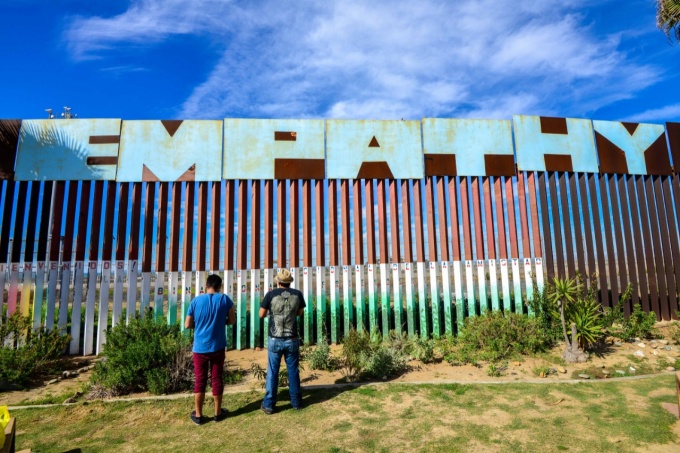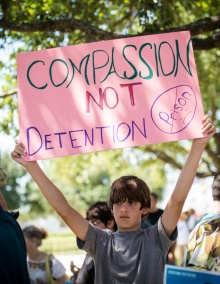Advocating for Asylum Seekers

Photo by Steve Pavey
By Jana Eisenberg | photos by Steve Pavey
In our national media, there is no escaping daily reports of the circumstances at our country’s southern border. And it’s not just the waves of asylum seekers or the lack of organized response to them. It’s also the larger issue of the systems currently in place in our country.
Every individual’s reaction to this crisis may vary—but two UB School of Social Work recent graduates were driven to take action. In January 2019, Leighann Ramirez, JD/MSW ’19, and Teresa Watson, MSW ’19, joined a group of UB Law School student volunteers and traveled to the largest refugee detention center in the U.S., in Dilley, Texas. Their intention was to help some of the many women and children housed at the South Texas Family Residential Center.
The weeklong trip, part of UB School of Law’s U.S.-Mexico Border Clinic course, took place under the auspices of the Immigration Justice Campaign’s Dilley Pro Bono Project.
Before embarking, the team all received training on immigration law and the asylum-seeking process. In addition, Watson conducted a three-hour crash course on trauma-informed care, preparing the law specialists the harrowing work which they were about to commence.
Prepping for the interviews
Each day, the student clinicians met with women and children in the “family residential center” (the moniker preferred by the detention center's for-profit operators) to help prepare them for the next official stage of the asylum-seeking process: the credible fear interview (CFI).
Once inside the center, the volunteers held charlas (roundtable conversations) to review with the asylum seekers the specifics of the process; what to expect. “In Dilley, we got to see the beginning stages of the asylum process. The person fleeing persecution or violence in their home country crosses over, says they are seeking asylum, has an initial interview, says they’re scared, and then they are placed in a cell—that the asylum seekers call a perrera (“dog cage”)—where they wait for their CFI to be scheduled, before they even arrive in the residential centers like the one we visited,” said Ramirez.
Because of the lack of consistency with the officials conducting the CFIs, preparation does not guarantee success. “The threshold to pass the CFI is not that high, but many fail without legal support,” said Ramirez. “Before the Dilley project was in place at this facility, the passage rate was 40%—now the percentage is up to the high 90s.”
Using a trauma-informed perspective
Holding CFI preparation meetings with women is traumatic for all involved, said Watson. Social workers understand that asking someone to repeat their story can bring up the trauma they’ve experienced, and that this can have many different manifestations—including gaps in memory.
And preparing for the CFI interviews was especially difficult, since the volunteer lawyers and social workers had to guide the women regarding which parts of their story to emphasize—which elements might give them a better chance of having their request for asylum moved to the next stage. The work is also hampered by language barriers.
The rapid shifts in criteria coming from the current anti-migrant administration affect the asylum application process. “No one really knew what was going to happen from one week to the next,” said Ramirez. Protections for domestic violence claims were revoked and then re-established—and the courts hadn’t decided the outcome by January of 2019.
So, during their sessions, the volunteer staff worked with the seekers to help them understand the criticality of their CFI statements. Most seekers don't understand, for instance, that if, during their asylum interview (which is held before a judge), they bring up a claim of fear not previously mentioned in their CFI, things can go badly. The judge may not accept it, or may view it as suspicious. Initially, establishing a dual claim during CFI written statement enables the women to be legally able to talk about other daily dangers, if domestic violence protections were overturned.
As the women told their stories, the clinicians had the difficult task of telling them that what may have been the most upsetting or traumatic part of their experience, like domestic violence, might not count toward establishing credible fear because of the current interpretation and application of the law. For the volunteers, said Watson, “telling women that their worst days weren’t the most relevant pieces to their claim felt like invalidating the pain the women had endured.”
“As advocates and social workers, we strive to be honest, caring and empowering with the information and choices we’re able to give the seekers,” she said. “They are working hard to keep themselves and their kids safe, and we’re working with them on ways to present their story.”
“It felt like an intense, crisis-full week,” added Watson. “While self-care is ethical and important, it can be hard to find the time and energy. This was also relevant for the law students. It was good that we could all act as a team, and use a buddy system. I advise not trying to push through if you’re feeling overwhelmed….you can miss important things. We stressed how trauma-informed care is best practice for almost anything, and why.”
Student reflections
“Strangely, I felt hope.”
“These women took their kids and left their homes, they traveled across entire countries over weeks or months; even in detention they took care of business for themselves and their children.”
“Every time a woman told me her story, I was floored by her resilience and strength…their power overwhelmed me.”
“These women’s lives. Their stories. Their legitimate fears, and the utter indifference of an asylum system that prioritizes male-dominated protected categories.”
“The patriarchal double standard is written into our laws; it is a part of our society as much as any other. Of everything I saw in Texas, this breaks my heart, every day.”
Excerpts from Teresa Watson’s last blog post about her experience in Dilley. To read her posts in their entirety, visit the School of Social Work’s blog at socialworksynergy.org.

Inside the South Texas Family Residential Center
Observations of UB social work students who visited the South Texas Family Residential Center—a migrant detention center—shed light on the inhuman state of life for refugee families. Detention center rules seemed designed to dehumanize.
According to Watson and Ramirez:
There is a strict dress code for women visiting the center—dresses must fall below the knee and low-cut tops and makeup are not allowed.
Visitors are not allowed to:
- Take any photographs inside the center.
- Bring bottled water to the residents. Only for themselves.
- Offer children toys, books or crayons to play with.
- Carry more than one day’s dose of over-the-counter medication, like ibuprofen, and not give any to the residents.
- Give any food to the residents.
Residents:
- Drinking water contaminated with arsenic and there are outbreaks of E. coli infections.
- Medical care was inadequate. Watson and Ramirez said they saw evidence of both adults and children with infections, and when they asked if they’d been given antibiotics, were told no, that if they were able to see a doctor, they were not given antibiotics.
Get Involved

Not everyone may be able to journey to Texas to give their time. There are many other ways people can get involved.
Immigration Justice Campaign (immigrationjustice.us) has a number of partners around the country always in need of volunteers.
Al Otro Lado (www.alotrolado.org) is a bi-national, direct legal services organization serving indigent deportees, migrants and refugees; they also provide many other kinds of assistance.
Justice for Migrant Families WNY (justiceformigrantfamilies.org) works locally to bridge the gap between the undocumented community and the larger Buffalo and immigrant community, to defend the human and civil rights for all immigrants in Buffalo. They also provide visitation services for people housed in the Batavia detention center.